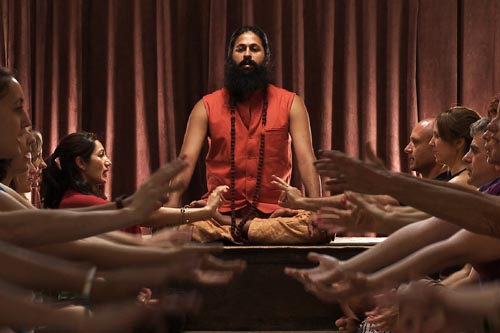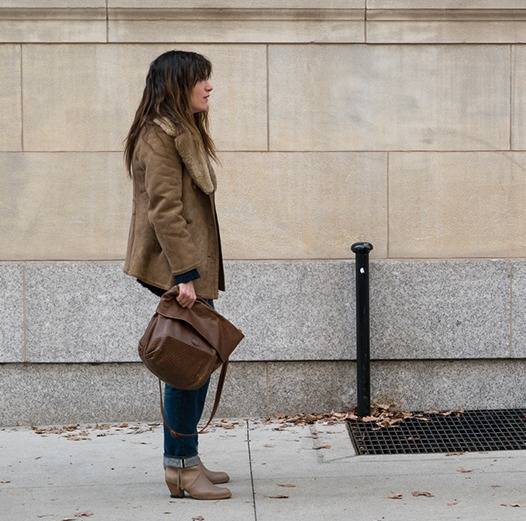
San Francisco’s Roxie Theater is a place of continuity, where the city has gone for a century to observe the ruling passions of the moment and discuss, Red Vines clenched firmly in fist, What Is To Be Done. On September 14, the issue on the table was atheism, and the three-hundred seat theatre was brimming with the bright stars in the atheist firmament (Greta Christina, Dave Fitzgerald, and Richard Carrier were all on hand) as well as the always heart-warming sight of new atheists finding for the first time that they are not, in fact, alone.
The films lasted from noon to midnight, a fact that should give us a bit of warm pause. A decade ago, would it have been possible to assemble a half-day’s worth of even obliquely atheist cinema? And now, well, the lineup speaks for itself: Jon Amiel’s Creation, Scott Thurman’s The Revisionaries, Scott Burdick and Sophia Winkler’s Sophia Investigates the Good News Club, Vikram Ghandi’s Kumare, the world premiere of Sylvia Broeckx’s Hug an Atheist, and Peter Mullan’s The Magdalene Sisters. Magdalene has been around for eleven years (and, yes, if you’re moderately freaking out about the fact that 2002 was eleven years ago, I’m right there with you), but all of the rest of the films were released within the last four years, a testament to something which I think we’ve all been viscerally sensing: the new generation of rising atheists have an undeniably creative, raucously fun streak in them that will make the next decade of humanism exciting in ways we can only begin to guess at now.
Take Kumare, in which Ghandi assumes the identity of an Indian guru, gathers a small but dedicated following of New Age Arizonians, and attempts to lead them to the realisation that they don’t need spiritual leaders. It’s a delicious spark of an idea that makes perfect sense in a post-Borat world but that would have been unthinkable at any previous point in film history. It would have been easy to make a “Look at how easily people can get talked into believing absolute nonsense” film, and just as simple to craft a “Everybody has the seeds of greatness” comeback tale, but Ghandi, at great and palpable personal pain, avoids both the ridiculing and lionizing of his followers. He desperately wants to make the movie where they’ve all been led to some capacity for self-reliance by the end, but seems to know that almost every frame of the film speaks the contrary. There is humour in that tension, but also a very big question for atheism: Can everybody be brought to intellectual self-reliance, to Enlightenment in the Kantian sense? Kumare comes out swinging for yes, concludes on maybe, and says in its heart, No. It’s an exciting journey to watch.
For all of that, however, what I really came to see was Broeckx’s film, Hug an Atheist. It’s been billed as the documentary that is finally going to put a real, human face on atheism as it’s lived day by day, and in that it thoroughly succeeds. Broeckx went out and found ordinary folks who happen to not believe in God and got them to open up about how they deal with everything from Santa Claus to finding a sense of community to dealing with terminal illness. These people, I think, make a case more compelling for the humanity of atheism than all of the professional atheists who, going against the advice of Elwood P. Dowd, have opted to be Oh So Smart rather than Oh So Pleasant. It’s a film which shows very clearly who we are, what we do, and what we have to overcome on a regular basis in a way that all of the theoretical formulations of our abstract intellectual concerns have never been able to quite press home.
There is the quiet but eloquent longing for fellowship of Harvard humanist James Croft, the loops and knots of atheist parenting hilariously expressed by my new favourite person, Maryellen Hooper, and the compassionate dignity of former Methodist minister Teresa MacBain, all nudging anybody who cares to look to the conclusion that incessant arguing isn’t what atheism is really about. Instead, we see a solid and centring realism that holds us together in times of tragedy, and a boundless curiosity that is not ashamed to take all of existence as its playpen, and find that a life based on these has a richness and potential every bit as vivid and satisfying as that spent in religious rapture.
So, yes, find it, buy it, and give it to anybody who asks you, “So, what’s it like, being an atheist, anyway?” The only thing I can say that is even moderately critical is that there is a LOT of Dan Fincke at the outset and, whereas he is very eloquent and interesting on the written page, the impression he gives off in these interviews is of a man desperately, breathlessly trying to catch a rather commonplace fish that is chaotically flopping about on the deck of his boat, muttering “So…” at the start of each fresh attempt to snare the little bastard. Sometimes you need to take a break and let the fish come to you. He shuffles off eventually, though, and from that point on the film is laughter and tears in equal measure, and beauty throughout both.
The other recent entry that I had the chance to catch was Sophia Investigates the Good News Club, which is a subject close to my heart, as I and a few parents in my children’s school district are currently in the midst of a struggle to fight back the encroachment of the Good News Clubs into our elementary schools. The 36-minute film is available for viewing in its entirety on YouTube, and, coupled with Katherine Stewart’s great investigative book on the subject, is just the thing to whip a reasonable human being into a simmering despair over the future of public education. That somebody had the idea of using school resources to emotionally humiliate children until they agree to proselytize their classmates is enough to sound a metallic clang in your estimation of basic human decency, and that there are now THOUSANDS of these organizations firmly entrenched in the American public school system (and heading to Europe as rapidly as they can) is almost too much to wrap the founding principles of ethics around. Sometimes, it’s all too ugly for me to look at, but it has to be faced up to, and this film is a good and engaging introduction to its worst excesses.
There was a time when an Atheist Film Festival would have been little more than a cavalcade of anger spiced here and there by flashes of eloquent resentment. Those days are seemingly behind us now – the whole of the human condition is being opened to us by a group of young, talented directors who see more in us than perhaps we realised we had to offer. The genre is bursting open. Does that mean we’ll see, sometime within the next five years, the first skeptic action movie, the first atheist bromance?
Probably not.
But Maybe.

